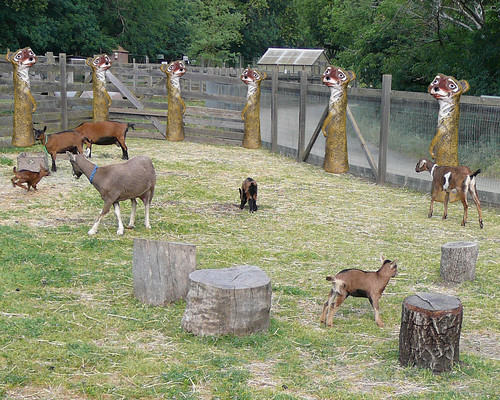Raising Boer Goats – 4 Important Considerations For Goat Farmers Who Are Interested

Image by dalefarwalker
With the birth of triplet kids, extra help was needed to watch the goats. Sentinals were added to raise the alarm should any threat come.
Created for Down Under Challenge #152.
VISIT here to see other creations from the same challenge
Article by Ted Allen
Raising Boer Goats – 4 Important Considerations For Goat Farmers Who Are Interested – Family
Search by Author, Title or Content
Article ContentAuthor NameArticle Title
Home
Submit Articles
Author Guidelines
Publisher Guidelines
Content Feeds
RSS Feeds
FAQ
Contact Us
Boer goats are known to be the best meat-producing breed in the world. Additionally, people find that raising boer goats is more productive because meticulous cross-breeding efforts can also yield animals with higher quality of meat. These large-bodied creatures produce the highest meat yield per animal and, therefore, are given a higher carcass value than the other goat breeds. Goat farmers also like raising goats especially Boer breeds because these animals can adapt to almost any kind of location and environment, and their reproductive rate is unsurpassed by the other goat breeds. If you are thinking about raising Boer goats as a business venture, here are a few things to consider.
1. Housing and fencing. Boer goats would need shelter and another area where it can exercise and graze. More often than not, establishing housing and fencing for these animals would be your highest expenses. The good news is: you do not really need to construct an expensive pen or fence to keep the goats happy. Just remember that: housing is where the goats can be kept at night, where they can be fed and watered in peace, and where kidding — or the birthing of baby goats can happen without interference. Fencing or the fenced grazing area should be large enough to allow the goats to freely roam and nibble without really wandering off. At the same time, the enclosure should be high and protected enough to deter possible predators like foxes or bears.
2. Having the individual goats regularly checked over by the local vet is always a good investment. After all, you are marketing the animals’ meat. Getting a clean bill of health for individual meat producers ensures that internal parasites, genetic anomalies and the onset of diseases are at the minimum. This helps improve the quality of meat, and produces a better genetic stock for breeding later on. A vet is also needed just prior to the flushing (or egg flushing) of the does. This will guarantee that the breeding female goats can produce healthy litters later on.
3. Raising Boer goats also means establishing a regular health regimen that includes: vaccination of the does and the kids, de-worming of the adults, grooming, and hoof trimming.
4. Boer goats are not known to become overweight, but the animals would still need to be exercised regularly. According to experts, a regular exercise regimen helps keep their meat tender, and prevent the goats from becoming destructive due to boredom. Herding goats to different pastures and allowing them to frolic can be great exercises.
About the Author
Are you considering on raising boer goats? Separate yourself from the usual goat owners who are prone to common mistakes. If you would like to learn more tips on caring for goats and how to raise goats correctly, please go to: http://www.raising-goats.com
Use and distribution of this article is subject to our Publisher Guidelines
whereby the original author’s information and copyright must be included.
Ted Allen
RSS Feed
Report Article
Publish Article
Print Article
Add to Favorites
Article Directory
About
FAQ
Contact Us
Advanced Search
Privacy Statement
Disclaimer
GoArticles.com © 2012, All Rights Reserved.

